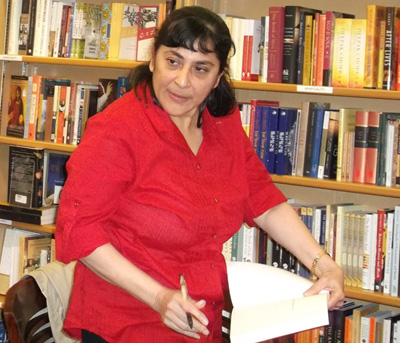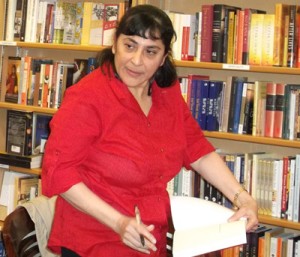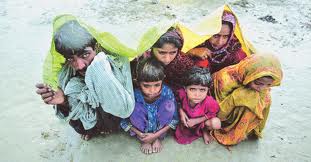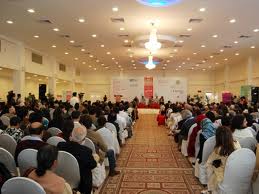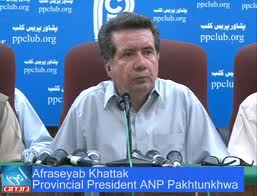
When former Northern Alliance leaders met with a group of influential US congressmen and businessmen in Berlin in early January, the meeting made a lot of waves in Kabul, because it created the impression that a broad anti-Karzai alliance was in the making and that it had started to muster support in the US. Furthermore, the meeting’s participants released a press statement demanding the decentralisation of the country.
Kabul reacted with accusations of anti-constitutional activities. AAN’s Thomas Ruttig, who was in Berlin (but not at this meeting), looks at the context: anti-Karzai alliance building, the heated Afghan discussion about decentralisation, federalism and even ‘division of the country’. He starts even to wonder to what extent a Somalia or even a Katanga-type scenario* – a mineral resources-induced partition – might emerge, if this alliance were to develop.
There were two conferences organised by the (German branch) of the Aspen Institute in Berlin recently.
The first one took place on 9 January and it brought together three or four Afghan leaders, four US Congress members and few US businessmen. No one from AAN participated in this or contributed to it (or was even aware of it until after it was over). But because of the controversial issues discussed there – for example suggestions to decentralise Afghanistan – and later published in a press statement (the only official part of this conference was a small press conference to which – it seems – only hand-picked journalists were invited), this is the one I am reporting about below.
The second conference took place on 10 and 11 January, in the same Berlin hotel. It was co-organised by Aspen and the German Konrad Adenauer Foundation. It brought together a number of academia, analysts and politicians from different countries, among them from Afghanistan – but none of the Afghans leaders who had participated or contributed to the first conference (Mssrs. Zia Massud, Dostum, Mohaqqeq and Saleh) were there; one of the US congressmen was. Its results will be published, and written contributions to it are already available online.
This includes a paper which I have been asked to write about possible post-2014 scenarios and which is among those available online. This is a work of analysis, not of preferences. (Although I call the scenario of a partition of Afghanistan a ‘freak scenario’ and dangerous there.)
After having been informed about the character of the first conference, I clearly stated at the second conference that issues that concern the political system in Afghanistan and possible changes to it need to be discussed, but decisions about this are the prerogative of Afghans only. Foreigners should keep out from making even recommendations. The same statement you will find in my blog below.
Original text continues:
There are probably few people in Afghanistan and outside who would disagree with the analysis coming out of the Berlin meeting of four Afghan leaders and four US Congress members. The statement signed after it and presented at a press conference on 9 January (find its full text at the bottom and here and see a picture of it here) calls Afghanistan’s present political system ‘dysfunctional because all the power is centralised’, criticised the Karzai government’s ‘incompetence and corruption’ and expressed the fear that the conduct of talks with the Taleban might lead to a ‘back room deal’ and a ‘sell-out’. Parliament needs to have more real power and political parties a bigger role in parliament, it says, and SNTV needs to be replaced by a better electoral system. Finally, the participants spoke in favour of a ‘national dialogue […] to correct the inherent flaws in the present power structure’.
The remedy proposed by the eight is more controversial: ‘decentralizing the political system’ in Afghanistan and ‘election of [provincial] Governors’. ‘[E]lected Governors and provincial councils should also have authority for such things as creating budgets and generating revenue, overseeing police and healthcare, as well as establishing educational authority, if they so desire.’ Rohrabacher even went as far as saying that ‘the overly centralized government power structure in Afghanistan is contrary to that country’s culture’.
**Federalism has been a long-standing political demand in parts of the Afghan north. Dostum’s Jombesh has been promoting this more openly over the past year or so and it has also become more popular among some other political groups among Tajiks and Hazaras, not least because of what is seen by them as the increasingly Pashtun-centric course set by the Kabul government. At the same time, many Pashtuns, including those who are critical of Karzai, see decentralisation as a euphemism for federalism, and federalism as the first step to separatism and the division of the country.
But as is often the case, it is not so important what was said (and much of it has been said in the past), but rather who has said it, in who’s company and where. The leaders who signed the statement with their full titles, claiming to represent ‘over 60 per cent of the Afghan population’, were:
‘Mr. Ahmed Zia Massoud, Chairman, National Front [Jebha-ye Melli]
General Abdul Rashid Dostum, Leader, National Islamic Movement of Afghanistan [Jombesh]
Haji Mohammad Mohaqiq, Leader, People´s Unity Party of Afghanistan [Hezb-e Wahdat-e Mardom]
Mr. Amrullah Saleh, Former Director, Afghan National Security Directorate’
(Note: It is not clear whether Mr Saleh was in Berlin personally or whether he gave his approval for the statement from somewhere else.)All of these men have been involved in the latest round of alliance forging in Afghanistan itself. They are trying to come up with a united, anti-Karzai front and possibly a single candidate for the 2014 presidential election who can challenge the incumbent’s still-to-be-chosen successor and enable him to have better chances than Qanuni in 2004 or Dr Abdullah in 2009.
What makes it even worse for Karzai is that, in 2009, Dostum and Mohaqqeq were still on his side and helped him to secure his majority, with claims that they had provided the Uzbek and large parts of the Hazara votes. Although it is still a long way to go to the 2014 elections and today’s alliances might break, Karzai knows that, without them, his successor will have difficulties winning.
Furthermore, the invitation list for Berlin*** had also included other major ‘Northern’ figures – current Second Vice President Karim Khalili, Dr Abdullah, Yunis Qanuni, Ustad Atta and MP Saleh Seljuqi, labelled a ‘Khan staffer’ (with apparent reference to Ismail Khan). They chose not to attend; after all, Khalili and Ismail Khan are part of the government in Kabul. But it was clearly the intention of Rohrabacher’s group to help to create the broadest possible anti-Karzai alliance.
Although the terrible F word (federalism) was avoided in Berlin, a push for decentralisation was probably never made so prominently – jointly by leaders from the Tajik, Uzbek and Hazara communities. And it was made from abroad. And from Berlin of all places where the German government had just helped the US open a direct channel to the Taleban, circumventing Karzai. It could be expected, including by the organisers, that this would create suspicion in Kabul where the government tends to blame foreigners for all mistakes and now clearly sees another conspiracy to undermine President Karzai and build up a political alternative. The Afghan foreign ministry condemned the meeting as ‘contrary to the spirit of national unity and the principles enshrined in the Constitution of Afghanistan’ and criticised the ‘plain interference’ of foreign countries.****
Karzai must also have raised concerns that a division of the country was being planned when he intervened with the US ambassador, Ryan Crocker, in Kabul. (Karzai reportedly also personally called the German foreign office by phone but the meeting was already over by then. He apparently had learnt of it too late.) Why else should Crocker have issued the following most remarkable four-sentence statement on 10 January titled ‘The United States Supports Afghan Unity’?‘
In response to recent press [sic] reports, the U.S. Embassy reaffirms the long-standing support of the United States for a unified Afghanistan based on the Afghan Constitution. Any assertions to the contrary are entirely without foundation. Reconciliation and the political process in Afghanistan are led by the elected government and the Afghan people. Any statement to the contrary is inaccurate.’
For Karzai, the constellation of players may well recall the situation in early 2008. Then, Obama’s pre-election team had started criticising him heavily for the widespread corruption he was presiding over and created the impression that any incoming administration would drop him in favour of a Pashtun team (Ali Jalali, Ashraf Ghani, Hanif Atmar and/or Gul Agha Sherzai) or Dr Abdullah. The group that met in Berlin was supported by influential people in Washington.
Among the four Congress members present, the Republican Dana Rohrabacher, is in his twelfth term and heads the influential House Foreign Affairs Subcommittee on Oversight; he is an Afghan old hand since the anti-Soviet jehad. Given the lack of a discernibly unified US strategy on Afghanistan, there is no way Karzai can be sure that what has been suggested in Berlin won’t become official strategy one day, particularly given the possibility of a Republican success in this year’s US presidential elections. Apart from that, it is well-known how political and business interests are often muddled in the US, particularly among US Republicans.
Rohrabacher himself is supported by a team that has openly been favouring the Northern Alliance for decades. Among them is Charlie Santos, another old Afghan hand***** who was present in Berlin but not mentioned on the participants’ lists (while other staffers were).
Rohrabacher himself called Santos a ‘confidant of Afghan Uzbek leader, General Dostum’ ina speech in 2009. In a US Congress hearing in 2003, and a number of interviews and articles, Santos had already advocated ‘the idea of federalism and the powerful role of democratically-elected local and regional governments as a way of creating trust and good will among diverse regions and communities’ in Afghanistan.
The 8 January meeting was also not the first of its kind. Already, on 31 July 2010, Rohrabacher and others met Zia Massud, Mohaqqeq and Dostum’s confidant and former MP, Faizullah Zaki.
The meeting went largely unnoticed at the time, but what did not go unnoticed was a highly controversial article by George W. Bush’s former deputy national security adviser, Robert D. Blackwill, that was published at the same time on the Politico blog. Blackwill suggested a ‘de facto partition’ of Afghanistan to ‘focus on defending the northern and western regions […], including Kabul’ with a ‘longtime residual U.S. military force in Afghanistan of about 40,000 to 50,000 troops’ and to ‘offer the Afghan Taliban an agreement in which neither side seeks to enlarge its territory’. ‘Human rights in the Taliban-controlled areas would also probably be abysmal, including for minorities’ but ‘the sky over Pashtun Afghanistan would be dark with manned and unmanned coalition aircraft — targeting not only terrorists but, as necessary, the new Taliban government in all its dimensions’. He added that ‘Karzai and his associates would almost certainly resist partition [my emphasis] — and might not remain in power.’
Afghanistan observers in the US, whose names cannot be disclosed, have told me that Santos claims to work as an advisor for US CENTCOM where the plan for the New Silk Road project was originally created. This includes regional transport corridors for goods and access to the re-discovered, but still unexploited, mineral wealth of Afghanistan for which the government in Kabul is currently trying to trigger an investment bonanza. These sources mainly see interests in northern Afghanistan’s mineral resources as being behind the Berlin meeting.
Even if the four Congress members’ initiative primarily aims to influence US policy on Afghanistan – for example against a power-sharing deal with the Taleban – or tends to inflate the importance of the factional leaders involved, it represent another attempt to shape Afghanistan’s future from outside the country.
Over the past ten years, though, it should have become obvious that such attempts tend to deepen conflicts in Afghanistan rather than alleviate them. Changes to the constitutional order and the political system, – based on what has worked over the past ten years and what hasn’t and why – as necessary as they are, should be the subject of a genuinely broad (ie not warlord-only) debate among Afghans.
The Americans involved ignore the fact that most of the Afghan leaders participating in Berlin have an extremely chequered past. Many were senior players in the events of the mid-1990s when, after the Soviet withdrawal and the fall of the PDPA/Watan regime, they failed to govern the country in a constructive way and, in the consequence, the country descended into factional warfare. In fact it was Dostum who, in January 1994 in a strange alliance with Gulbuddin Hekmatyar and Khalili’s former boss, Abdul Ali Mazari, tried to break the increasingly monopolistic power of Jamiat led by Rabbani and Ahmad Shah Massud over Kabul. The surprise military attack comprised probably the worst rocketing of the war for Kabul. It was a particularly bloody chapter in a period characterised by war crimes and human rights violations by all factions and the complete breakdown of the state. It led many Kabulis to later see the Taleban as a force liberating them from warlordism.
In this context, the likely scenario resulting from the kind of decentralisation as proposed in Berlin – with elected governors and far-reaching budgetary and police autonomy – is easy to imagine: Dostum would win provincial governor election in gas-rich Jowzjan, Ismail Khan in Herat, Ustad Atta in Balkh and so forth. The local people may end up in a situation that is not better than now, just different: with officialised ‘ethnic’ fiefdoms, ruled by armed factions, as corrupt as the current centre-run country and financed by mining and ‘service’ companies. This would cement armed warlord rule, not democracy. Instead of one unstable Afghanistan, Afghans would get a handful of small unstable ones.
The comparisons this brings to my mind of where this sort of politicking could lead are of places like Somalia, the two Sudans or post-independence Congo. As in a ‘Somalia scenario’, provinces or regions could drift away from each other and a functionally even weaker Kabul than the current one – which would become as unimportant as Mogadishu in the current Somalia.
This could even lead gradually to a full breakup of the country, even if it had not been intended initially. This might trigger another round of a ‘civil’ (or factional) war, ‘low intensity’ enough for the outside world to ignore, but terrible enough for the Afghans, simply because mineral deposits will be disputed between regions or provinces. (Look at the new South Sudan, for example.) A ‘simple’ north-south split, whether official or ‘just’ de facto, could lead to the same results. If any side in such a scenario is supported and possibly financed from outside, based on interests in minerals, it might even resemble the almost forgotten secessionist Katanga episode of 1960 which was only the beginning of a serious of wars still continuing. In any case, the – let’s call it – Rohrabacher/NA alliance is playing with fire.
Therefore, decentralisation should not be discussed at half-secret meetings abroad. This just creates further mistrust and deepens the already growing ethnic rifts in the country. It is as exclusive as hand-picked jirgas are. Instead, any discussion about possible changes to the country’s political system should be organised in Afghanistan, as a public process where Afghan local communities, intellectuals and others have the same say as political leaders. Foreign politicians are entitled to their own opinions but should be extra careful when expressing them and must avoid re-drawing borders on the maps hanging in their offices, after all that already has gone wrong in Afghanistan.
Annex:
Rep. Rohrabacher Leads Bipartisan Delegation’s Afghanistan Strategy Session With National Front Leaders in Berlin
Calls Any Taliban Inclusion in Coalition Government A “Betrayal”
Berlin, Germany, Jan 9 – Today, Rep. Dana Rohrabacher (R-CA), led a bipartisan Congressional delegation strategy session with leaders of Afghanistan’s newly formed National Front, to discuss alternatives to Hamid Karazi’s [sic] consideration of including the Taliban in Afghanistan’s coalition government. Reps. Louie Gohmert (R-TX), Steve King (R-IA), Loretta Sanchez (D-CA) and several leaders of Afghanistan’s National Front joined Rep. Rohrabacher in Berlin.
“The Afghans and Members of Congress meeting in Berlin today have concluded that there is a serious concern the blood and treasure invested in Afghanistan over this last decade may well have been in vain,” said Rohrabacher. “The overly centralized government power structure in Afghanistan is contrary to that country’s culture and has inhibited progress toward building a stable and democratic society there.
“The incompetence and corruption of Karzai’s government has now brought serious consideration to accepting the Taliban as part of the coalition government, this would be a betrayal of those Americans who shed their blood in the last decade, as well as, a sellout of the brave Afghans in the North Alliance who cast their lot with us after 9/11 in order to defeat the Taliban dictatorship. All participants in this meeting agreed that if the Taliban wants to participate in running for democratic office, they should be permitted to do so, but they should not be included in a back room deal among power brokers so that they would hold some kind of authority and power in an upcoming Afghan government.”
Upon conclusion of the briefing, both groups issued the following joint policy statement:
“We call for a national dialogue on a revised Constitution to correct the inherent flaws in the present power structure by decentralizing the political system, making it more compatible with the diverse political, social and cultural nature of Afghanistan. The Afghan people deserve and need a parliamentary form of democracy instead of a personality-centered Presidential system.
“We firmly believe that any negotiation with the Taliban can only be acceptable, and therefore effective, if all parties to the conflict are involved in the process. The present form of discussions with the Taliban is flawed, as it excludes anti-Taliban Afghans. It must be recalled that the Taliban extremists and their Al-Qaeda supporters were defeated by Afghans resisting extremism with minimal human embedded support from the United States and International community. The present negotiations with the Taliban fail to take into account the risks, sacrifices and legitimate interests of the Afghans who ended the brutal oppression of all Afghans.
“In order to speed the withdrawal of international forces, the participants believe it is essential to strengthen regional and national institutions that are inclusive and represent the concerns of all the communities of Afghanistan.
“The participants favor a change in the Electoral System from a Single Non Transferable Vote System to a nationally accepted variant of the Proportional Representation system with equal opportunities for both independent candidates, the political parties, or tribal representatives. We also support the election of Governors and empowerment of provincial councils. Such elected Governors and provincial councils should also have authority for such things as creating budgets and generating revenue, overseeing police and healthcare, as well as establishing educational authority, if they so desire.”
Mr. Ahmed Zia Massoud, Chairman, National Front
General Abdul Rashid Dostum, Leader, National Islamic Movement of Afghanistan
Haji Mohammad Mohaqiq, Leader, People´s Unity Party of Afghanistan
Mr. Amrullah Saleh, Former Director, Afghan National Security Directorate
Representative Dana Rohrabacher (R-California)
Representative Loretta Sanchez (D-California)
Represenative [sic] Louie Gohmert (R-Texas)
Representative Steve King (R-Iowa)
Rep. Dana Rohrabacher is Chairman of the House Foreign Affairs Subcommittee on Oversight.”
* Not everybody might remember: Katanga is a once separatist mineral-rich province in the south of what now is the DR Congo and what once had been the Belgian Congo, then Congo-Leopoldville, then Congo-Kinshasa, then Zaire. When the country became independent in 1960 and an anti-colonialist leader, Patrice Lumumba, became head of the government, the former colonial power and mining companies organised a separatist rebellion in Katanga. During a military coup Lumumba was captured, handed over to the separatists and murdered by them.
In 1965, General Joseph-Désiré Mobutu (later Mobutu Sese Seko) emerged as the country’s president and created what became known as one of the world’s most notorious kleptocracies where billions of aid money were channelled into private bank accounts of the dictator abroad. After he was toppled in 1997, the new government started to recover the money.
** It also transpired that Rohrabacher stated in Berlin that Afghans do not ‘deserve’ statehood and referred to the former Northern Alliance groups as the only US allies in Afghanistan. Another Berlin demand – for a ‘national dialogue on a revised Constitution’ (my emphasis) – even opens up a weak flank to the Taleban who reportedly demanded the same (without being specific on what points exactly) when meeting US representatives when the opening of the Qatar office was discussed.
*** It can be found here but the website is not one hosted by the meeting’s organiser, the Aspen Institute Germany. It seems to be authentic, however, because the same list has been sent by Aspen to media in Berlin.
**** Muhaqqeq, on Rah-e Farda TV (14 January, as monitored by AAN Kabul) countered and said there are ‘some fascist around the palace’, hinting at the government’s intention to talk with the Taleban: ‘We are from this people, we are their representative, we stand to defend this land, we suffered due tot he war against the Taleban, we are the survivors of the Yakaolang, Bamian and Mazar massacres’. He also talks about the Berlin conference on a Youtube video.
Other Afghan reactions to the meeting can be found here, here and here.
The Taleban also reacted to the Berlin meeting with two articles in their web site: ‘Afghanistan is undividable’ and ‘Old Partition plan and new players’. Here are the links to the Pashtu and the English versions.
***** He was ‘UN Political Advisor on Afghanistan; Deputy and Senior Political Advisor, United Nations Special Mission to Afghanistan (1987-1995); Vice President, Centgas Consortium (1996 to1999); Senior Vice President, Delta Oil Company’, as it is summarised on the website of another company (established in 2009) of which he is (or has been) part of the board of directors.
Centgas was a consortium of Saudi Delta Oil and UNOCAL (now merged with Chevron) that tried to build a pipeline from Central Asia’s gas and oil fields through Afghanistan to Indian Ocean ports in the mid-1990s (in competition with another consortium including the Argentinian Bridas).


